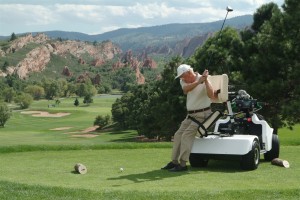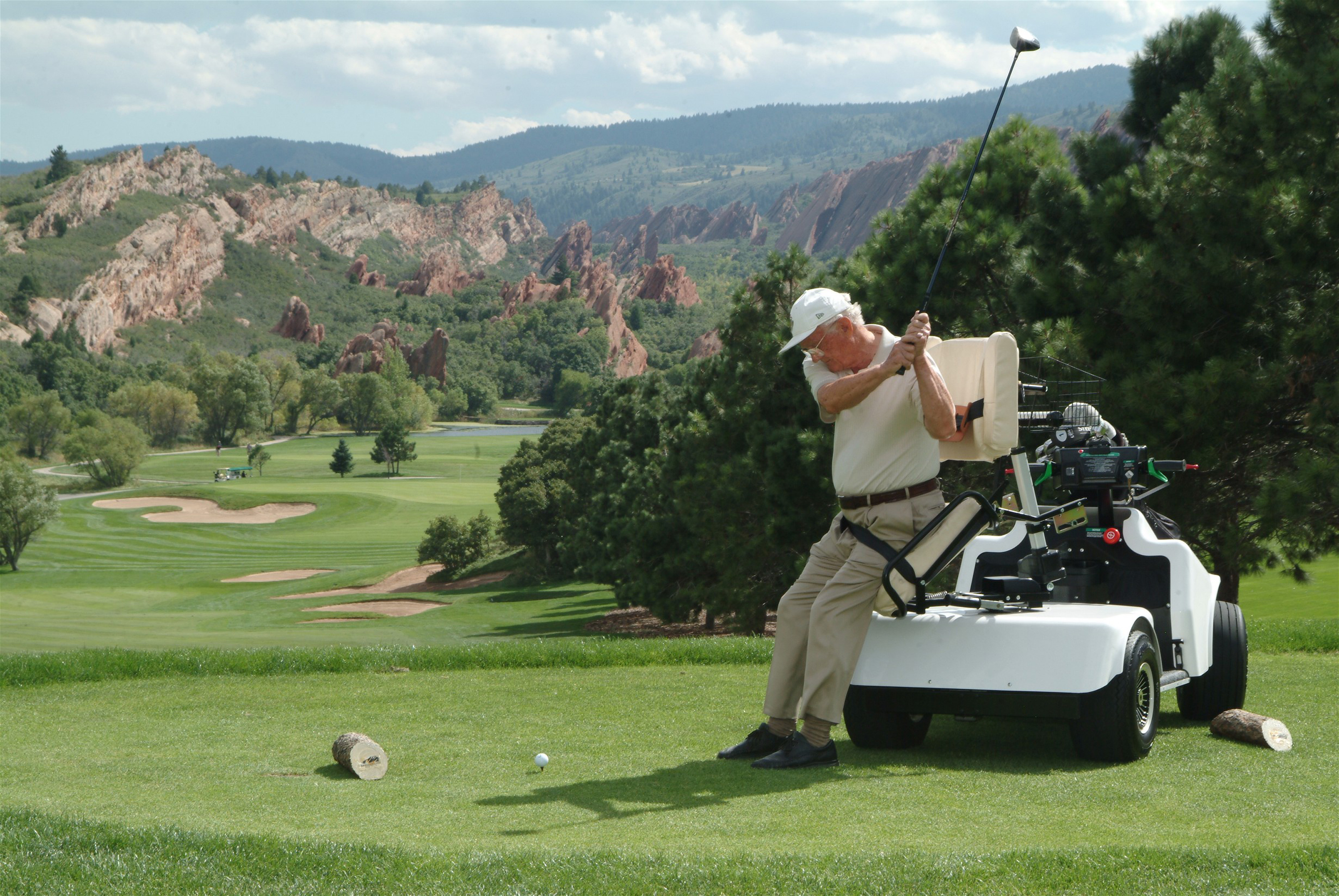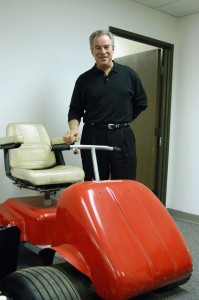By Shari Valenta

Every SoloRider comes with an electric seat that actually raises a player into a relatively natural position to play golf.
SoloRider
For those who are mobility-impaired, the sport of golf seems impossible. SoloRider is trying to change that. This Centennial business has become known worldwide for their Single-Rider Golf Car, a revolutionary machine with movable seats that allow handicapped players to stand and swing at a relatively natural position. Every tournament players club in the United States owned by the PGA Tour is equipped with these vehicles.
Roger Pretekin is the founder and president of SoloRider. The business began in 1991 after he noticed mobility-impaired golf enthusiasts couldn’t watch the action at a local tournament.
“I owned a company years ago,” said Pretekin. “It was a business that designed all of the underground communications for PGA Tour televised events in Castle Pines (a private golf club in Castlerock, Colo.). While working on the golf course, I was approached by a group of people in wheelchairs. They asked if I could build a viewing area for them so they could watch the shots come in around the 18th green. To the credit of Castle Pines, they decided to create a level of accessibility.”
Pretekin is not only a businessman, but also a spokesman for the rights of the disabled in the golfing community.
“I think this is a great way for people that have severe spinal cord injuries to rehabilitate and get back into the fabric of society,” remarked Pretekin. “Golf is such a great sport; it provides wonderful hand-eye coordination and self-esteem building and it allows the disabled to do things they probably thought they’d never do again.”
Casey Martin is a disabled professional golfer who thought he would no longer be able to compete. He has a circulatory disorder in his right leg and difficulty walking. In 1997, he requested the right from PGA Tour to ride a golf cart while participating in the public competition. When he was denied this accommodation, he filed suit under the Americans with Disabilities Act.
The ADA requires public access to facilities and provides the equal opportunities for people with disabilities. In 2001, the Supreme Court found that Martin’s use of a golf cart didn’t alter the game or allow a competitive advantage. Now Martin has a legal right to ride in a cart between shots at PGA Tour events.
To the chagrin of public golf courses, compliance covered by ADA meant that many had to purchase single-rider golf carts. Providing access doesn’t mean providing the specialized vehicle. However, if an individual decides to press charges for being denied equal accesses to a public facility, many courses find it easier to purchase the cart to avoid litigation. However, Pretekin says there are many financial advantages to purchasing the vehicle.
“The price is not much more than a regular golf car,” argues Pretekin. “If you’re buying a regular golf car one at a time you might pay $6,000; our car starts around $7,800 with the electric stand-up seat.”
Pretekin says that the mechanisms pay for themselves because when the handicapped come out to play, they tend to bring colleagues who end up spending a considerable amount of money at the course.
“Recently, I got a phone call from the president of Pebble Beach (Resorts),” said Pretekin. “He received a call from an individual that is disabled and asked specifically if his facility offered SoloRider cars. We just delivered three so he said yes. The caller said, ‘I’m the chairman of a company and I’m bringing in nine executives to your resort for our corporate meeting and we want to play golf.’
“They all came out; they stayed for quite a long time and all 10 of them played golf every day at $375 a round each. They each stayed in $500 per night rooms, ate all their meals there, bought all their equipment there, and probably spent in the neighborhood of about $50,000 that week. When they were leaving, the CEO said to the president, ‘We had a wonderful time. Thank you for accommodating us, but you should know had you not had these cars available, we would’ve gone some place else.'”
Many courses are keen to bring in business but worry that these specialized vehicles may destroy the integrity of the greens.
“Our golf car is designed in such a way that it’s very light to the turf,” explained Pretekin. “It’s very easy ergonomically for the individual to access all the controls and go virtually anywhere on the course without creating damage, slow play or any of the things that the golf industry fears. In fact, the car with a 230-pound rider on it and a set of golf clubs puts about one-half of the ground pressure of an average man standing. These cars can be driven over greens with less impact than a person in a walker by far.”
Businesses and individuals are buying SoloRider cars. One polio survivor from Tampa, Fla., bought a SoloRider and it changed his life. He thought it was such a great tool for the disabled that he went ahead and purchased the company.
“Monroe Berkman is our chairman,” announced Pretekin. “A few years back, he broke his leg playing golf out of a standard golf car. Basically, he used to get into the car, pull up to the green and then get out and balance himself with crutches. He usually was able to take a swing and grab the car before he fell.
“One day he missed the car. He broke what was left of his good leg and it took him out of the game completely. He obviously felt very depressed as it was a game he loved. Later, through an investor in our company, he found our car. He came to the PGA (Merchandise) Show where we were showing it.”
Pretekin said he liked it so much he wrote a check for it that day.
“We sent him a car and he called a few weeks later and said, ‘This is such an incredible product that I’m forming a foundation and I want to purchase 100 cars. I want to donate them to rehabilitation hospitals and facilities that are taking care of the soldiers that are paralyzed and missing limbs,'” he recalled. “About a year ago he bought the company. We’ve grown in leaps and bounds since then. His goals were never to make money; he’s said that from the very beginning. He wants to give the same experience to others who may not have the opportunity.”
Pretekin is sure that his business will continue to flourish as the baby boomer generation grows old, creating a need for SoloRider cars not only to play golf but also simply to enjoy a beach or other past times that would normally require walking.
“The Veterans Administration has purchased cars for some of the soldiers coming back from war,” said Pretekin. “I feel we have a responsibility as a country to integrate these individuals back into society. As they go through rehabilitation and are trying to figure out what to do with the rest of their lives, they may find that this is one way to get back into it.”
SoloRider Management, LLC is located at 7315 S. Revere Parkway Suite 604. For more information, call (303) 858-0505 or visit [http://www.SoloRider.com].












